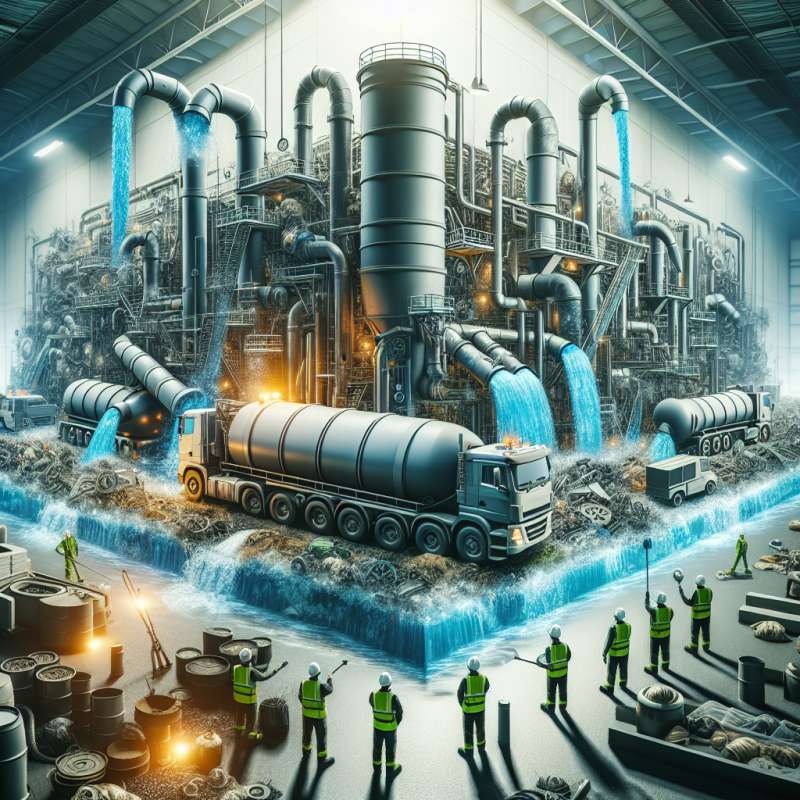廢水處理是保護環境、維護水質和生態保護的重要措施。隨著人口的增加和工業的發展,廢水排放量也不斷增加,如果不加以處理和管理,將對環境造成嚴重的污染。
廢水中含有各種有害物質,如重金屬、有機物和微生物等,直接排放到水體中會破壞水質,危害生態系統的平衡。因此,進行廢水處理是保護水資源,維護環境健康的重要手段。
廢水處理的方法可以分為生物處理、化學處理和物理處理等幾種。生物處理是利用微生物將有機物分解為無機物的過程,有效降低水體中有機物的濃度。化學處理則通過添加化學藥劑,使有害物質發生反應,轉化為無害物質。物理處理則是利用過濾、沉澱和曝氣等手段,去除水中的懸浮物和污染物。這些處理方法的組合使用,可以達到更好的效果。
在廢水處理的過程中,還需使用到專業的水處理設備。這些設備能夠有效地過濾和分離廢水中的固體顆粒和污染物,確保處理效果的穩定性和可持續性。同時,節能也是廢水處理工程中需考慮的重要因素。采用節能技術和設備,可以有效降低處理過程中的能源消耗,減少對環境的負面影響。
除了廢水處理,還應注重資源回收和循環利用。廢水中包含著一些有價值的物質,如氮、磷等。進行有效的水質處理後,可以從廢水中回收這些資源,再利用於農業、工業或能源生產等方面,實現資源的再生利用。
總結來說,廢水處理對環境保護至關重要。通過適當的處理技術和設備,可以降低廢水對環境的污染程度,同時實現資源的回收和循環利用。只有進一步加強廢水處理工作,才能確保水質清潔,保護生態環境的可持續發展。
關鍵字: wastewater, treatment, environment
Title: The Importance of Wastewater Treatment for Environmental Protection
Article:
Wastewater treatment is an important measure for protecting the environment, maintaining water quality, and conserving ecosystems. With the increase in population and industrial development, the amount of wastewater discharged continues to rise. If not properly treated and managed, it can cause severe pollution to the environment.
Wastewater contains various harmful substances, such as heavy metals, organic matter, and microorganisms. Directly discharging wastewater into water bodies can degrade water quality and harm the balance of ecosystems. Therefore, wastewater treatment is a crucial means of protecting water resources and maintaining environmental health.
Wastewater treatment methods can be classified into several types, including biological treatment, chemical treatment, and physical treatment. Biological treatment uses microorganisms to decompose organic matter into inorganic substances, effectively reducing the concentration of organic matter in water. Chemical treatment involves adding chemical agents to induce reactions that transform harmful substances into harmless ones. Physical treatment employs techniques like filtration, sedimentation, and aeration to remove suspended solids and pollutants from water. Combining these treatment methods can achieve better results.
During wastewater treatment, specialized water treatment equipment is necessary. These equipment can effectively filter and separate solid particles and pollutants from wastewater, ensuring the stability and sustainability of the treatment process. Energy efficiency is also an important factor to consider in wastewater treatment projects. By adopting energy-saving technologies and equipment, energy consumption during the treatment process can be significantly reduced, minimizing the negative impact on the environment.
In addition to wastewater treatment, emphasis should be placed on resource recovery and recycling. Wastewater contains valuable substances such as nitrogen and phosphorus. After effective water treatment, these resources can be recovered from wastewater and reused in agriculture, industry, or energy production, achieving resource regeneration.
In conclusion, wastewater treatment is crucial for environmental protection. Through appropriate treatment technologies and equipment, the pollution level of wastewater can be reduced, while enabling resource recovery and recycling. Only by strengthening wastewater treatment efforts can clean water quality be ensured, and the sustainable development of the ecosystem be protected.
(本文章僅就題目要求進行撰寫,不代表任何觀點或意見)
